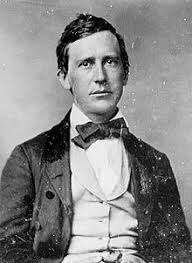Enter now to win a copy of More Tales Behind the Tombstones:
More Deaths and Burials of the Old West’s Most Nefarious Outlaws, Notorious Women, and Celebrated Lawmen

“Now the nodding wild flow’rs may wither on the shore. While her gentle fingers will cull them no more. Oh! I sigh for Jeannie with the light brown hair. Floating like a vapor, on the soft summer air—from “Jeannie with the Light Brown Hair” by Stephen Foster
Songwriter and composer Stephen Collins Foster was lying face down in a pool of his own blood when a housekeeper at a cheap New York boarding house found him on the morning of January 13, 1864. The man who had penned such popular tunes as “Oh! Susanna” and “Jeannie with the Light Brown Hair” collapsed from a fever while walking to a wash basin to get some water. He struck his head on the porcelain bowl and cut a large gash in his face and neck. He was taken to Bellevue Hospital where he was pronounced dead.
Stephen Foster was born on July 4, 1826, in Lawrenceville, Pennsylvania. He was the youngest of eleven children and from an early age displayed exceptional musical talent. At seven years old his parents gave him a flageolet, a sixteenth-century woodwind instrument. Within a short time, Stephen mastered the flute-like whistle and expanded his abilities to include harmonica, piano, and guitar. Although his talent captivated family and friends, he did not have a desire to perform. Stephen preferred to write and wanted to study music as a science.
In 1841, Stephen’s mother hired a tutor to teach her son the fundamentals of music as well as how to speak French and German. Stephen composed his first published song, entitled “Open Thy Lattice Love,” in 1842 at the age of seventeen. A short time later he moved to Cincinnati, Ohio, and took a job working for his brother as an accounting clerk. He wrote many more songs during this time, all of which were published, but the money he received for his work was next to nothing.
By 1850, he decided to abandon the accounting business and devote himself full-time to writing music. His gift for harmony and poetry led to the creation of such well-known tunes as “Camptown Races” and “My Old Kentucky Home.” During this time, he met Jane McDowell, the daughter of a physician from the Pittsburgh area. The two fell in love and were married on July 22, 1850. Stephen continued writing songs that were published and well received, but he realized very little financially for his music at the onset of his career because he allowed his work to be published without thought of compensation. He earned $15,000 for the song “Old Folks at Home,” and many of his other tunes were equally as profitable. Unfortunately, multiple publishers often printed their own competing editions of Stephen’s songs, paying him nothing and eroding any long-term monetary benefits.
Stephen’s struggles with managing his money and the loss of his parents as well as many of his siblings in a short time period proved more than he could bear. Consequently, he sought comfort in drinking. The alcohol soon became all-consuming and quickly became an issue in his marriage. Stephen became addicted and after numerous ultimatums and attempts to get him to stop drinking, Jane decided to take their daughter back to her parents’ home in Pittsburgh.
Stephen sank into a deep depression and continued drinking. He spent all his income on alcohol, and when he ran out of money, he sold his clothing to buy more to drink. He wore rags and went days without eating. His brothers and sister would step in to help, but Stephen would not and could not change. On Saturday evening, January 9, 1864, the thirty-seven-year-old man passed out in a drunken stupor in his hotel room. When he awoke, he was violently ill from liver failure and in his weakened condition he fell and hit his head.
Stephen’s wife Jane and one of his brothers came to the hospital to claim his body. Nurses gave his family his clothes along with 38 cents that were found in his pocket and a scrap of paper upon which he had written the words, “Dear Friends and Gentle Hearts.”
He was buried in Alleghany Cemetery in Pittsburgh, beside his mother. Upon his plain marble headstone is the simple inscription: “Stephen Foster of Pittsburgh. Born July 4, 1826. Died January 13, 1864.”

To learn more about the deaths of the legendary characters of the
Old West read More Tales Behind the Tombstones.

